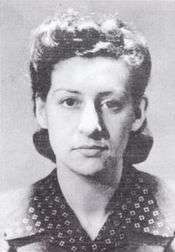Denise Bloch
Denise Madeleine Bloch (French pronunciation: [dəniz blɔʃ] (![]()
Denise Bloch | |
|---|---|
 | |
| Nickname(s) | Ambroise |
| Born | 21 January 1916 Paris, France |
| Died | 5 February 1945 (aged 29) Ravensbrück concentration camp |
| Allegiance | |
| Service/ | Women's Transport Service (FANY) Special Operations Executive, French Resistance |
| Years of service | 1942–1945/1943–1945 (SOE) |
| Unit | Clergyman Detective |
| Awards | King's Commendation for Brave Conduct Légion d'honneur Médaille de la Résistance Croix de Guerre |
Early life
Bloch was born to a Jewish family (Jacques Henri Bloch and Suzanne Levi-Strauss) in Paris, France in 1916. She had three brothers. Her father and two of her brothers were French soldiers taken prisoner by the German army in 1940. Her mother, her brother Jean-Claude, and Denise then lived a clandestine life avoiding persecution as Jews by using false papers and identities. In July 1942, the Bloch family was smuggled across the border from occupied France to unoccupied Vichy France. In Lyon Denise came into contact with Jean Aron, a Jewish engineer for Citroen who was working with the French Resistance and the SOE network led by Philippe de Vomécourt.[1]
Special Operations Executive
Bloch was recruited in Lyon to work for the SOE. She began resistance work with SOE radio operator Brian Stonehouse until his arrest near the end of October that year.
Following Stonehouse's capture, she went into hiding until early 1943 when she was put in touch with SOE agents George Reginald Starr and Philippe de Vomécourt. She began working with them in the town of Agen, in the southern French department of Lot-et-Garonne. However, it was decided to send her to London and accompanied by another agent, she walked across the Pyrenees mountains making their way to Gibraltar and eventually London. There, SOE trained her as a wireless operator in preparation for a return to France.
On 2 March 1944, with fellow SOE agent Robert Benoist, she was dropped back into central France. Working in the Nantes area, the pair re-established contact with SOE agent and Benoist's fellow racing car driver, Jean-Pierre Wimille. However, in June, both she and Benoist were arrested and Bloch was interrogated and tortured before being shipped to (Germany). She was held in prisons at Torgau in Saxony and at Königsberg in Brandenburg, where she suffered from exposure, cold and malnutrition.
Bloch was eventually sent to Ravensbrück concentration camp. Sometime between 25 January 1945 and 5 February she was executed by the Germans, and her body was disposed of in the crematorium. She was 29. Lilian Rolfe and Violette Szabo, two other female members of the SOE held at Ravensbrück, were executed at about the same time. In May, just days before the German surrender, SOE agent Cecily Lefort was also executed. It is alleged that SS-Sturmbannführer Horst Kopkow was involved in the arrest and killing of these SOE agents.
Bloch's family gravesite at the Montmartre Cemetery in Paris memorialises her life and execution.
Recognition
Awards
| UK | 1939-45 Star | |
| UK | France and Germany Star | |
| UK | War Medal with King's Commendation for Brave Conduct | |
| France | Légion d'honneur (Chevalier) | |
| France | Croix de Guerre with palm | |
| France | Médaille de la Résistance | |
Monuments
_memorial%2C_Brookwood_Military_Cemetery%2C_5_July_2017.jpg)
- Brookwood Memorial as one of 3,500 "to whom war denied a known and honoured grave".[2]
- FANY memorial (First Aid Nursing Yeomanry) in Wilton Road, Kensington.
France
- Valençay SOE Memorial in Valençay, Indre, in the "Roll of Honour" of the 91 men and 13 women members of the SOE who gave their lives for France's freedom.